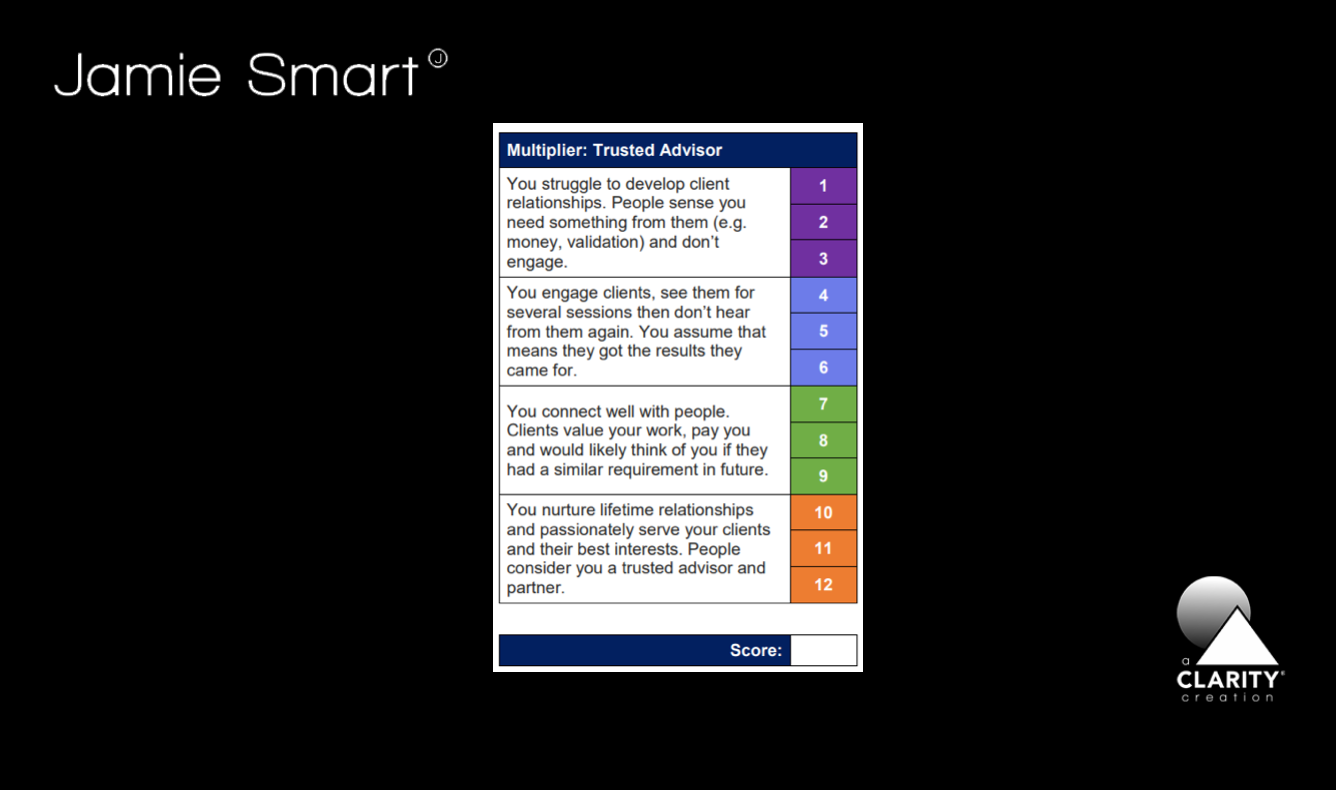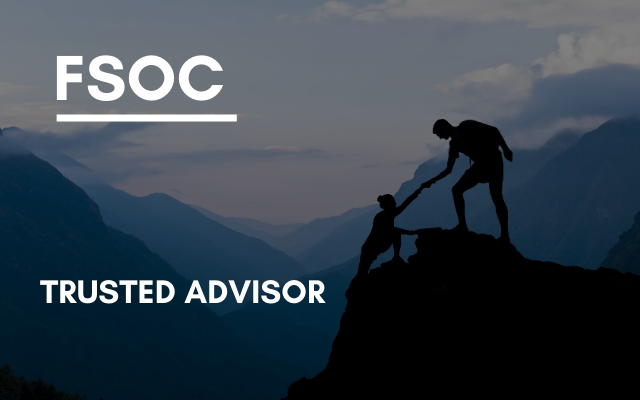FSOC – Trusted Advisor
Released on July 24th, 2020
In today´s Friday Shot Of Clarity, we’re exploring Multiplier Number Four: Trusted Advisor.

This ‘multiplier’ is the fourth in a series of articles taken from a tool and a short book I created a few years back for helping people grow their professional practices. It covers 10 ‘multipliers’ that can amplify the impact and results you’re creating in the world.
And while I created it with coaches, therapists and other transformation professionals in mind, I’ve had plenty of feedback from people outside those professions telling me how useful it is.
Whether you’re a transformation professional or not, you’re going to discover that these 10 multipliers apply to almost everyone (at least, with a little creativity).
Your Interpersonal Transformation
The next three professional practice multipliers are focused around what I call impact: your interpersonal transformation.
Here’s why this is important. Your impact is what people pay you for. It’s the difference you can make to them; your ability to take them through the transformations they want to experience and get the results that matter to them.
Once again, when I talk with coaches, therapists, consultants and other transformation professionals, they often try to convince me they have a sales problem, a marketing problem or that they don’t understand social media (for instance). When I scratch the surface, it almost always turns out to be a symptom of a grounding or an impact problem. The first three mindsets were “grounding”. The next three are “impact”.
Multiplier Number Four: Trusted Advisor
One of the keys to having an exponential practice is to develop a “trusted advisor” relationship with your clients. A trusted advisor is someone who you absolutely know is acting in your best interest. A trusted advisor is typically someone whose call you’d take if they phoned you while you’re eating dinner.
In the first row, you struggle to develop client relationships. People sense that you need something from them (e.g. money, validation) and don’t engage. If you believe your wellbeing and security is dependent on the client or the deal or the money, your client is going to pick up on that and they’ll be repelled by it. This is the essence of neediness and I sometimes refer to it as “client repellant”. When people are in that, they’re stuck, which is why I call row one the “stuck” row.
In the second row, you engage clients, see them for several sessions then don’t hear from them again. You assume that means they got the results they came for. A lot of people starting out don’t think in terms of long term relationship; they think in terms of the transaction. Part of the reason is they’re a little insecure about their ability to have an impact so they end the relationship as soon as the transaction is complete. That way, they don’t have to deal with hearing about something that didn’t work as well as they’d hoped.
In the third row, you connect well with people. Clients value your work, pay you and would likely think of you if they had a similar requirement in future. Sometimes, people in the third row are still thinking in terms of the transaction but more often you’re already moving into the long term relationship space. Connection is part of this. The ability to have a deep-felt connection with your clients isn’t just important for relationship building; it’s also one of the keys to having a transformational impact.
Now, in the fourth row, you go exponential. You nurture lifetime relationships and passionately serve your clients and their best interests. People consider you a trusted advisor and partner. When you have this depth of connection and relationship with your clients, it changes the game in terms of what you can do for them.
In order to make progress and improve in this practice multiplier, you need to start thinking in terms of a lifetime relationship. How would you be relating to this person if you knew that you’d be working with them for the rest of your professional life? How would you be serving them? What leadership qualities would you be demonstrating?
One of the keys to this is what I call “clarity of connection”, and it’s like rocket fuel for developing trusted advisor relationships. Why? Because a deep-felt sense of connection carries its own credibility. It carries its own authority and its own guidance.
A great example of this is certified Clarity Coach and Trainer, Sarah Phipp. Sarah is a transformational coach and nutritional therapist. When you talk to Sarah, you absolutely know she has your health and wellbeing at heart. She’s focused on your best interests and on serving you.
When we started working with Sarah, she was under-charging but as she improved her ability to connect with clients and focus on the longer-term relationships and results, she was able to move to a high-value package model which resulted in even more phenomenal results for her clients and for her. Here’s why: When a client signs up to a package and to a longer term result, they’re more committed to achieving that result. Whereas when people are paying by the hour, they unconsciously look to minimize their exposure (think about times when you’ve hired an electrician or a plumber; they charge by the hour, so you’re hoping they finish the job as quickly as possible).
When you sign up for something over a longer period of time, you want to get the most from it. By moving to a high-value package model, Sarah found her clients were more committed and invested in the relationship.
Another example is Phil Lewis, a strategic marketing consultant who works primarily with Fortune 500 companies. Phil was already very successful when he came on the Clarity Certification Training programme. As he gained a deeper understanding of the mind’s innate self-clearing capacity, he reported finding he had far less on his mind during client pitches. As a result, he was able to connect more deeply and be more responsive and in the moment which helped him win a lot more work for both him and his team.
The third and final example is coach and therapist, Russell Davis. Russell is a perfect example of a trusted advisor because he works with couples around fertility. Imagine it: these are people who have been struggling to have a baby for a long time and trust is absolutely essential. Russell is in a position to help them with one of the most important changes in their lives and guide them through what may be a very challenging time.
Partnership is essential. Russell came on our Thriving Coaches Blueprint programme and ended up completely changing his relationship with the sales process by focusing on developing “trusted advisor” relationships. He’s gone from feeling uncomfortable and stressed about selling to really enjoying it. He’s doubled his fees and he finds that clients are happy to pay it in the context of this new trusted advisor relationship.
If you want to cut to the chase and read about all 10 multipliers so you can download your free copy of the Thriving Coaches Scorecard book here in the Clarity Life Community.
You’re going to discover what you need to do to…
– Escape the “charge by the hour” trap and earn a healthy income
– Have a “dream come true” impact in the lives of your clients
– Develop the certainty, confidence and competence you desire
– Grow your practice in ways that feel great and deliver real results
>> You can download your free copy of the Thriving Coaches Scorecard book here.
To your increasing clarity!
Big love
Jamie
Jamie Smart, Sunday Times Bestselling Author, Speaker and Executive Coach
PS You know how most people have a lot to deal with, a lot on their minds? We teach something that automatically clears your mind, and leaves you with the clarity and confidence that you have everything you need to solve your problems, make a difference in the world and enjoy life to the full.
Learn more at www.JamieSmart.com
